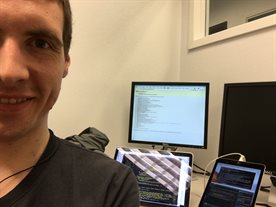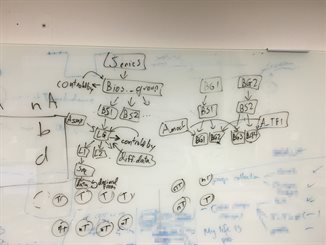ESR4 Fabio D'Orazio
October 2016: Max Planck Institute for Molecular Biomedicine, Germany
Data analysis is crucial when dealing with Next Generation Sequencing (NGS) technology, not trivial at all but extremely powerful if well executed.
As a mainly wet-lab scientist, I decided to exploit the opportunities the network provides, take a RNA-Seq dataset with me and make my way to Münster.
There, Juanma Vaquerizas kindly offered to help myself and my project providing support and training at the Max Planck Institute for Molecular Biomedicine. With years of experience in NGS data analysis and a solid group of bioinformaticians, I couldn't imagine any better place where to go.
As i expected, I found devoted and talented scientists, keen to help and in particular an extremely friendly environment.
Besides few technical issues (which were promptly overcome), the RNA-Seq analysis was smoothly completed within two weeks, ending up with a dataset of differential expressed genes.
Although dedicated to my project, I managed some sightseeing of the picturesque and crowded Münster, always kindly guided by my colleague and patient supervisor Benjamin Rodriguez.
After 20 fruitful days, I headed back towards Birmingham, aware of having gained skills for independently facing data analysis workflows and a consolidated friendship.
ESR14 Matthias Hoertenhuber
February-March 2016: ZFIN in Eugene, Oregon, USA
ZFIN (ZebraFish Information Network) is the biggest database dealing with zebrafish as a model organism. With my project goal of building the annotation backbone for the DANIO-CODE consortium (danio-code.zfin.org), it was a natural choice for me to go there. I hoped to get feedback on our system, get insights in their data structures and working processes and build connections with the people there.
Leaving a wintery Stockholm, I arrived at Eugene, which was full of blossoming flowers greeting the start of spring. My welcome into the ZFIN team was equally warm and got the chance to receive very useful feedback for our database. I was also able to attend all meetings by the developers and see how they use SCRUM to organize their development cycles.

Me in front of my desk at ZFIN.
Besides that, I got the chance to visit ZIRC, the zebrafish facility right next to ZFIN (my first time seeing actual zebrafish!). I also had time to explore Eugene (a nice, cozy college town with still some hippie spirit left) and on the weekends also its beautiful surrounding nature.

Things you see while wandering around Eugene.
Because I was already at the US west coast, my supervisor Carsten suggested that I should also go to Berkeley to visit our advisors for ZENCODE, Ben Brown and his postdoc Marcus Stoiber, who were already helping us a lot with the development of our database. So I stayed there for three days, which turned out to be highly productive. There is just something about discussing an idea in front of a white board or going through the code together, a Skype call can never reproduce (it also helped that Marcus had a laptop + water bottle accident, which gave me his undivided attention for a day (-:).

The result of a very productive day
I took a lot of things home from this secondment visit, besides the direct input for my project.
First, two weeks were too short. In hindsight it would have been better if I could have stayed there maybe a month, developed one feature for our database based on ideas I got there and also got a round of feedback on it. A longer stay would also have allowed several meetings with some people, so I could iterate more on the insights I got.
Second, how many more connections I was able to build at ZFIN, which helped me a lot also in later stages of the database development.
Third, how a larger team works together on a database and see that the problem they are facing are often similar to the ones we had.
Forth, that the US is a very nice place, but I don’t know if I would consider to go there for a postdoc position.
And lastly, skype calls are not enough for collaborations.
|